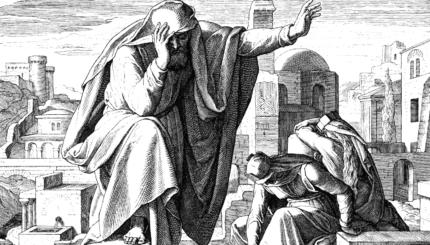Many Tu Bishvat haggadot (books detailing the liturgy and rituals of the seder) draw on biblical texts to teach about humanity’s connection with nature, the land of Israel, and ultimately, humanity’s relationship with God. At times there is an interconnection. For example, the promise of abundance in the land of Israel is based on following God’s will. The following selections are just a taste of what is found in the Torah on the subject of humanity and nature. The Torah translations are reprinted with permission from Tanakh: The Holy Scriptures, published by the Jewish Publication Society.
God Created Humanity To Rule Over the Earth
God said, “Let us make man in our image, after our likeness. They shall rule the fish of the sea, the birds of the sky, the cattle, the whole earth, and all the creeping things that creep on earth.” And God created man in His image, in the image of God He created him; male and female He created them. God blessed them and God said to them, “Be fertile and increase, fill the earth and master it; and rule the fish of the sea, the birds of the sky, and all the living things that creep on earth.”
 God said, “See, I give you every seed-bearing plant that is upon all the earth, and every tree that has seed-bearing fruit; they shall be yours for food. And to all the animals on land, to all the birds of the sky, and to everything that creeps on earth, in which there is the breath of life, [I give] all the green plants for food.” And it was so. And God saw all that He had made, and found it very good. And there was evening and there was morning, the sixth day.
God said, “See, I give you every seed-bearing plant that is upon all the earth, and every tree that has seed-bearing fruit; they shall be yours for food. And to all the animals on land, to all the birds of the sky, and to everything that creeps on earth, in which there is the breath of life, [I give] all the green plants for food.” And it was so. And God saw all that He had made, and found it very good. And there was evening and there was morning, the sixth day.
— Genesis 1:26-31

Help us keep Jewish knowledge accessible to millions of people around the world.
Your donation to My Jewish Learning fuels endless journeys of Jewish discovery. With your help, My Jewish Learning can continue to provide nonstop opportunities for learning, connection and growth.
Commentary on Genesis 1:26, 28
1:26: The term “rule” is the rule of a master over a servant.
1:28: Master it: God gave them power to rule over the land to do as they wish with the cattle and the reptiles, and all that creeps in the dust, to build and to “uproot the planted,” and from the hills to mine copper, and so on.
– Nachmanides, commentary on Genesis, chapter 1. Rabbi Moshe ben Nachman (1194-1270), known as Nachmanides, was a Spanish rabbi, poet, philosopher, and physician.
Humanity’s First Encounter With a Tree
The LORD God planted a garden in Eden, in the east, and placed there the man whom He had formed. And from the ground the LORD God caused to grow every tree that was pleasing to the sight and good for food, with the tree of life in the middle of the garden, and the tree of knowledge of good and bad.
The LORD God took the man and placed him in the garden of Eden, to till it and tend it. And the LORD God commanded the man, saying, “Of every tree of the garden you are free to eat; but as for the tree of knowledge of good and bad, you must not eat of it; for as soon as you eat of it, you shall die.”
— Genesis 2: 8-9,15-17
The Rules of Tithing
When you enter the land and plant any tree for food, you shall regard its fruit as forbidden. Three years it shall be forbidden for you, not to be eaten. In the fourth year all its fruit shall be set aside for jubilation before the LORD; and only in the fifth year may you use its fruit that its yield to you may be increased: I the LORD am your God.
— Leviticus 19:23-25
The Sabbatical Year: When the Land Replenishes Itself
The LORD spoke to Moses on Mount Sinai: Speak to the Israelite people and say to them: When you enter the land that I give you, the land shall observe a sabbath of the LORD. Six years you may sow your field and six years you may prune your vineyard and gather in the yield. But in the seventh year the land shall have a sabbath of complete rest, a sabbath of the LORD: You shall not sow your field or prune your vineyard. You shall not reap the after-growth of your harvest or gather the grapes of your untrimmed vines; it shall be a year of complete rest for the land. But you may eat whatever the land during its sabbath will produce — you, your male and female slaves, the hired and bound laborers who live with you, and your cattle and the beasts in your land may eat all its yield.
— Leviticus 25:1-7
The Jubilee Year: Ultimately, the Land Belongs to God
You shall count off seven weeks of years–seven times seven years–so that the period of seven weeks of years gives you a total of forty-nine years. Then you shall sound the horn loud; in the seventh month, on the tenth day of the month–the Day of Atonement–you shall have the horn sounded throughout your land and you shall hallow the fiftieth year. You shall proclaim release throughout the land for all its inhabitants. It shall be a jubilee for you: each of you shall return to his holding and each of you shall return to his family. That fiftieth year shall be a jubilee for you: you shall not sow, neither shall you reap the after growth or harvest the untrimmed vines, for it is a jubilee. It shall be holy to you: you may only eat the growth direct from the field. In this year of jubilee, each of you shall return to his holding. …
But the land must not be sold beyond reclaim, for the land is Mine; you are but strangers resident with Me. Throughout the land that you hold, you must provide for the redemption of the land.
Moshe
Pronounced: moe-SHEH, Origin: Hebrew, Moses, whom God chooses to lead the Jews out of Egypt.

Help us keep Jewish knowledge accessible to millions of people around the world.
Your donation to My Jewish Learning fuels endless journeys of Jewish discovery. With your help, My Jewish Learning can continue to provide nonstop opportunities for learning, connection and growth.
Torah
Pronunced: TORE-uh, Origin: Hebrew, the Five Books of Moses.

Help us keep Jewish knowledge accessible to millions of people around the world.
Your donation to My Jewish Learning fuels endless journeys of Jewish discovery. With your help, My Jewish Learning can continue to provide nonstop opportunities for learning, connection and growth.
Tu Bishvat
Pronounced: too bish-VAHT (oo as in boot), Origin: Hebrew, literally “the 15th of Shevat,” the Jewish month that usually falls in January or February, this is a holiday celebrating the “new year of the trees.”

Help us keep Jewish knowledge accessible to millions of people around the world.
Your donation to My Jewish Learning fuels endless journeys of Jewish discovery. With your help, My Jewish Learning can continue to provide nonstop opportunities for learning, connection and growth.


